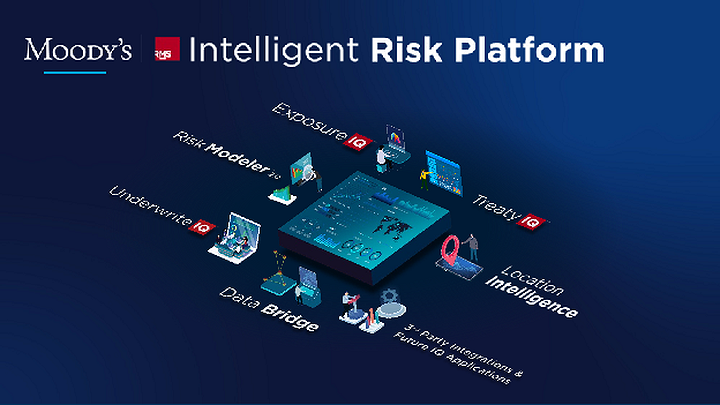Businesses are constantly seeking ways to employ digital transformation strategies that streamline their operations, improve productivity, and boost profitability. One such strategy is the adoption of Software as a Service (SaaS) platforms which offer wide-ranging benefits, including cost savings, scalability, and flexibility.
In a traditional SaaS model, it is the software vendor that hosts and maintains the servers, databases, and the code that constitutes an application, eliminating the need for clients to install and run applications on their computers or in their data centers.
Moody’s RMS Intelligent Risk Platform (IRP) together with its hosted applications employs a SaaS model, and by utilizing SaaS, Moody’s RMS takes on many of the day-to-day IT responsibilities that our clients would have managed when using an on-premises-based risk modeling system, such as software maintenance, environment updates, and IT planning and procurement.
Additionally, by using a SaaS model, clients accessing applications available on the IRP can focus solely on generating and utilizing risk analytics insights, rather than worrying about accessing their organization’s servers, capacity, or suffering compute power constraints, or whether they are accessing the latest exposure data, risk models – it is all managed for them when using the platform.
The Value of Certified SaaS Platforms
Maintaining and operating robust security for an insurer's IT systems is particularly important, especially because of their usage of customer data.
A critical advantage of SaaS platforms that often goes unnoticed by users but is mission-critical for IT and compliance is security. Internationally recognized certifications like ISO 27001, AICPA SOC, and C5 industry certifications serve as valuable markers to signal the strength of an IT environment.
For a platform to achieve these certifications, it must comply with stringent IT security measures that are continually tested and evaluated.
SaaS platforms with industry certifications offer numerous advantages over systems without. First, certifications provide reassurance that a platform has undergone rigorous security assessments and audits, ensuring data is protected against potential threats.
Second, certifications signify that a platform will adhere to strict security protocols and standards, reducing the risk of data breaches, and ensuring compliance with legal and regulatory requirements.
This is particularly important for businesses operating in industries where data security is paramount, such as finance, healthcare, and e-commerce.
The IRP has achieved numerous certifications to help clients safeguard sensitive data and maintain compliance with industry regulations.
Let's dive into each one so you can better understand how the IRP can help you achieve your security objectives.
1. ISO 27001 is one of the most widely recognized certifications for information security management. It provides a framework for establishing, implementing, maintaining, and continually improving an information security management system.
When a SaaS platform is ISO 27001 certified, it means that they have implemented a robust security management system and are committed to maintaining high levels of security.
You can validate the state of ISO 27001:2013 by clicking on this link and searching for ‘Risk Management Solutions’ as the ‘Organization Name.'
2. Moody’s RMS maintains an SSAE18 SOC2 Type II certification for its platforms and products with regular audits conducted by an AICPA-approved audit firm.
The American Institute of Certified Public Accountants (AICPA) SOC (Service Organization Control) certification is a series of auditing procedures that ensures a service provider securely manages data to protect an organization’s interests and the privacy of its clients.
3. Moody’s RMS holds a C5 (ISAE 300) attestation. C5 is the German Federal Office for Information Security BSI Cloud Computing Compliance Controls Catalogue (C5). Additional information can be found here.
The C5 certification, a standard established by the German Federal Office for Information Security, is rapidly becoming a recognized standard for cloud security. It provides a baseline of security controls that cloud service providers should adhere to, ensuring a high level of security.
In addition to these certifications, the Intelligent Risk Platform incorporates additional security measures, such as penetration testing, continuous integration, and continuous delivery (CI/CD) to provide clients with an even more robust platform:
- Penetration testing simulates cyber-attacks against the system to check for exploitable vulnerabilities. It is an essential component of a comprehensive security strategy, helping businesses identify potential weaknesses and take proactive steps to address them.
- CI/CD forms the backbone of software delivery and is a method to frequently deliver platforms and applications to customers by introducing automation into the stages of code development.
The main concepts attributed to CI/CD are continuous integration, continuous delivery, and continuous deployment. CI/CD removes manual errors, makes delivery and deployment processes more efficient, and accelerates product releases.
Full Automation for System Validation
SaaS platforms such as the IRP, offer full automation for system validation. This means that the system routinely checks itself for errors or inconsistencies, ensuring that data is accurate, reliable, and secure.
Automated system validation reduces the risk of human error, enhances data integrity, and ensures that the system is always operating at its best.
Two additional areas where SaaS wins over legacy on-premises software solutions are scalability and total cost of ownership:
Scalability: The Cloud Advantage
A significant advantage of SaaS platforms is their scalability. Unlike traditional on-premises software that may require significant hardware upgrades to scale, SaaS platforms leverage the power of the cloud, allowing businesses to easily scale up or down based on their needs.
This flexibility is particularly beneficial for businesses with fluctuating demands, enabling quick adaptation to change without incurring excessive costs.
In conclusion, selecting a SaaS platform for your business offers numerous security benefits. From internationally recognized certifications to penetration testing and full automation for system validation, these platforms provide a robust security infrastructure that can significantly enhance your business's data protection capabilities.
If you are a decision maker for your business’s platform modernization strategy, making the shift to a SaaS platform, like the Moody’s RMS Intelligent Risk Platform, will not only ensure that your business is equipped with the best security measures but also provide peace of mind knowing that your sensitive data is in safe hands.

For more information on Moody’s RMS Intelligent Risk Platform, click here and for more information on the platform security measures, click here for more details.











